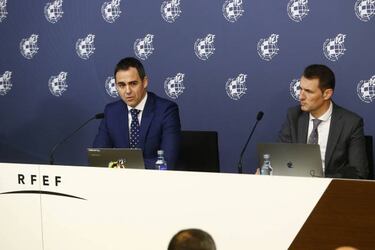VAR chief and Florentino's threat
For anyone interested in how VAR is working, I'd advise you to take time to reflect carefully on the words of Velasco Carballo, the man responsible for the system in LaLiga.
For anyone interested in how VAR is working in practice, I'd advise you to take time to reflect carefully on the words of Velasco Carballo, the man responsible for the system in LaLiga. It's so easy nowadays! He dissected the achievements and failures of the process over the first round of fixtures; revealed conversations from those at the top to those at the bottom; explained that those who manage the system are connected by a WhatsApp group, where they share their judgments; presented data of what is and isn't included; admitted errors and enumerated corrections. With or without VAR, it's good that the refereeing is explained, and it is even better that fans listen to that explanation...despite the risk of being convinced.

The Vinicius VAR focus
Related stories
Velasco Carballo has a good profile. He is well trained, a technical engineer, and has a built-in safeguard: as he is from Madrid, he has never officiated a game with Los Blancos. That had protected him from all the wrangling that those who cross swords over any doubtful or controversial decisions face. But maybe now it is happening, because although we were fairly satisfied with VAR (even if previously reluctant, as was the case with me), it turns out that nothing has been the same since the Vinicius situation. Cristiano Ronaldo is the top scorer in Italy, Raúl de Tomás is doing more at Rayo than any striker at Madrid, but the Real problem is that Vinicius was not given a penalty.

Not perfect, but better
Florentino says that he's considering running from the Federation. This is a setback for Rubiales, who has positioned himself closer to him (in spite of the situation with Lopetegui) because all alliances are welcomed in his war with Tebas. And why do they want more in Barcelona: Florentino taking advantage of an error by VAR to destroy a system that tries to bring more clarity to the decision making. Velasco Carballo has done well to come out and speak because VAR is going through its lowest point so far and can still be improved. Ideally, though, Rubiales and Tebas would give a hand in this case and give credit to a system that doesn't eliminate errors, but reduces them considerably.
